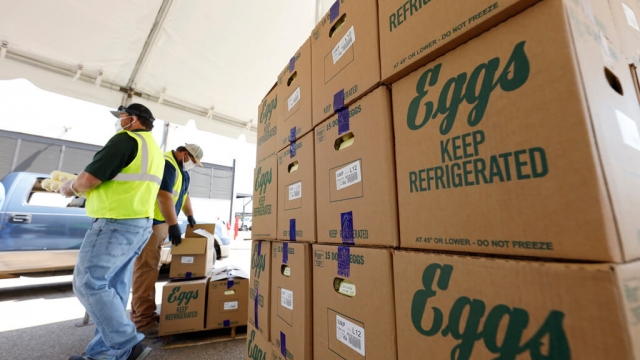DENVER — A growing bird flu outbreak among dairy cows in the United States has been confirmed in Colorado for the first time, state officials said Friday.
The outbreak of Highly Pathogenic Avian Influenza (HPAI) H5N1 among a dairy herd in northeast Colorado was first reported to the state veterinarian Monday. Samples submitted to CSU’s Veterinary Diagnostic Laboratory tested presumptive positive for HPAI two days later and were confirmed by the U.S. Department of Agriculture’s (USDA) National Veterinary Services Laboratory (NVSL) on Thursday, according to a news release.
The detection of H5N1 in dairy cows in Colorado raises the number of affected states to nine, and the number of affected herds across the U.S. to 34, according to the latest data from the USDA.

Signs of HPAI in dairy cows include decreased feed intake, decreased milk production, and abnormal colostrum-like milk, though affected cattle appear to recover after supportive care, state officials said.
“We continue to see this ongoing HPAI outbreak evolve and over the last month have seen transmission of the virus now move into dairy cattle,” said state veterinarian Dr. Maggie Baldwin. “While we don't yet completely understand the mechanism of transmission of this virus, we do know that it appears to be spreading from cow to cow and between herds."
Baldwin stressed it was critically important that producers across the state implement enhanced biosecurity measures to mitigate spread of bird flu in cattle, such as monitoring herds for disease, limiting the movement of cattle, limiting the movement of vehicles and visitors off livestock and poultry premises, and reporting any odd behavior or die-offs in domestic and wild animals immediately. Additional actions cattle owners can take can be found here.
Officials said Friday Colorado’s bird flu response website will be regularly updated as the outbreak continues to evolve, adding the state Department of Agriculture (CDA) was working with the Colorado Department of Public Health and Environment (CDPHE) to provide disease control guidance for people exposed in the outbreak.
In all, state officials said Colorado has 106 dairies and approximately 200,000 dairy cows.
Are milk and milk-related products safe to consume in Colorado?
While research lead by the FDA has detected remnants of bird flu in retail milk, federal agencies including the USDA, the FDA, and the National Institutes of Allergy and Infectious Diseases (NIAID) have stated that commercial milk products are safe to consume because they undergo pasteurization before entering the market.
Still, the FDA is conducting further research by attempting to grow the virus from the genetic remnants of H5N1 found in retail milk in order to assess whether live virus is found in those samples. Those results will be available in the coming days, according to STAT News.
“At this time there is no concern about the safety of the commercial milk supply, or that pasteurized milk poses a risk to consumer health,” state officials said in their news release Friday. “Pasteurization has continuously proven to inactivate bacteria and viruses in milk.”
Despite detection of bird flu in dairy cows, “the risk to the general public remains low,” according to the U.S. Centers for Disease Control and Prevention (CDC), with state officials saying bird flu remains “mainly an agricultural issue in poultry and now in dairy cows.”

State
Bird flu linked to deaths of black bear, mountain lion in Colorado, CPW says
Two human cases of the most recent variant of H5N1 have been reported in the United States: A Colorado man in April 2022 who handled sick poultry and only reported fatigue for a few days; and a Texas farm worker who contracted the virus in March of this year after handling sick cattle – the first case of cattle-to-human transmission in the U.S. That man developed pink eye as a result of the infection, Texas health officials said.
No human-to-human transmission of bird flu has been detected thus far.
Earlier this week, the USDA issued a federal order requiring laboratories to test and report HPAI cases to the agency, as well as mandatory testing for all lactating dairy cattle moving across state lines. On Friday, the USDA published an accompanying guidance document to clarify those requirements.
Outside of interstate travel, testing remains voluntary and encouraged only for visibly sick animals, STAT News reported Thursday.
The World Health Organization (WHO), the World Organization for Animal Health (WOAH), and the UN Food and Agriculture Organization (FAO) this week weighed in on the recent developments of H5N1, calling on nations to “fully assess the risk among occupationally exposed persons” while asking countries to rapidly share any data "to understand the exposure and risk from milk and milk products."
“At the present time, based on available information, WHO assesses the overall public health risk posed by A(H5N1) to be low," officials said Tuesday. The risk for those exposed to infected birds, animals or contaminated environments is considered low-to-moderate, WHO officials said.





